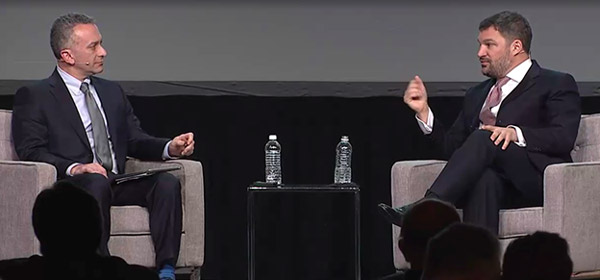Louis Gave: China Is Leading a Once-in-a-Generation Shift to Inflation
- Patrick Watson
- |
- March 9, 2018
- |
- Comments

Source: Mauldin Economics
At the Strategic Investment Conference 2018, Louis Gave, co-founder and CEO of Gavekal Research, talked about “game-changing policy shifts” and massive social changes that are underway in China.
One of the most notable changes is Xi Jinping’s effort to pull the Chinese economy away from pollution-heavy industries. Cement, steel, and textile industries are under pressure—they are forced to cut back production and reduce supply.
The president of the People’s Republic of China initiated the new policies a couple of years ago, said Gave. Now the reform is intensifying.
The China-style “supply-side reform” is exposing an inherent contradiction in our thinking. We believe central banks can always inject liquidity and companies can always get more efficient.
If these are true, Gave raised the question, why is there excess capacity in the system? Because China has been building it due to the low inflation and deflation of the last two decades.
Meanwhile, the rest of the economy responded with its own “overcapacity optimizers” like Uber and Airbnb. These will be less necessary as China soaks up the overcapacity.
This will be a big change, and few see it coming.
China’s Reform Amid US Struggles
Meanwhile, the US deficit has been deteriorating for the last two years, yet we did not have a recession. The problem is that it’s hard to cut spending. Gave likened this situation to Europe 20 years ago.
Tax cuts coupled with increased spending will mean record budget deficits for years to come. The US fiscal policy is not stable and, Gave said, the markets are starting to realize it.
If that’s the case, he asked, who will fund the ever-expanding US deficit?
There are only a few possibilities: the Federal Reserve, US banks loading up on Treasury paper, domestic investors, or foreign investors. None look inclined to do it.
Further, the US dollar shows no promise and acts like an emerging-market currency. It has failed to rally even as interest rates rise, markets fall, or other central banks sound dovish.
Considering the US debt situation and lack of other obvious financing sources, it seems likely that the debt will be paid with a weak dollar. Hence Xi’s decision to ramp up China’s imperial ambitions.
A Structural Shift to Inflation Is Underway
Gave said the People’s Bank of China is the only central bank in the world that is truly hawkish on inflation.
Chinese Marxists blame inflation for the 1989 Tiananmen Square incident and don’t want it to happen again. Gave sees a shift coming as China leads the world out of the disinflationary boom and bust cycles. Gold prices and bonds are also signaling a shift to inflation.
Conclusion: We could be seeing a structural, once-in-a-generation shift to inflation. This will require radically different thinking for most investors. US Treasury bonds will no longer be good diversifiers. Gold, and possibly RMB bonds, will replace them.
Gave is also interested in Eastern Europe—one of the regions he’s looking at. Countries there will benefit from China’s infrastructure rollout, which reduces its dependence on Germany and Russia.
Get Live Updates from the Strategic Investment Conference 2018
Learn from 25 top financial experts, best-selling authors, and investment professionals as they discuss their best investment ideas and predictions for the economy, financial markets, and geopolitical relations. Tune in to the SIC 2018 live blog now!
